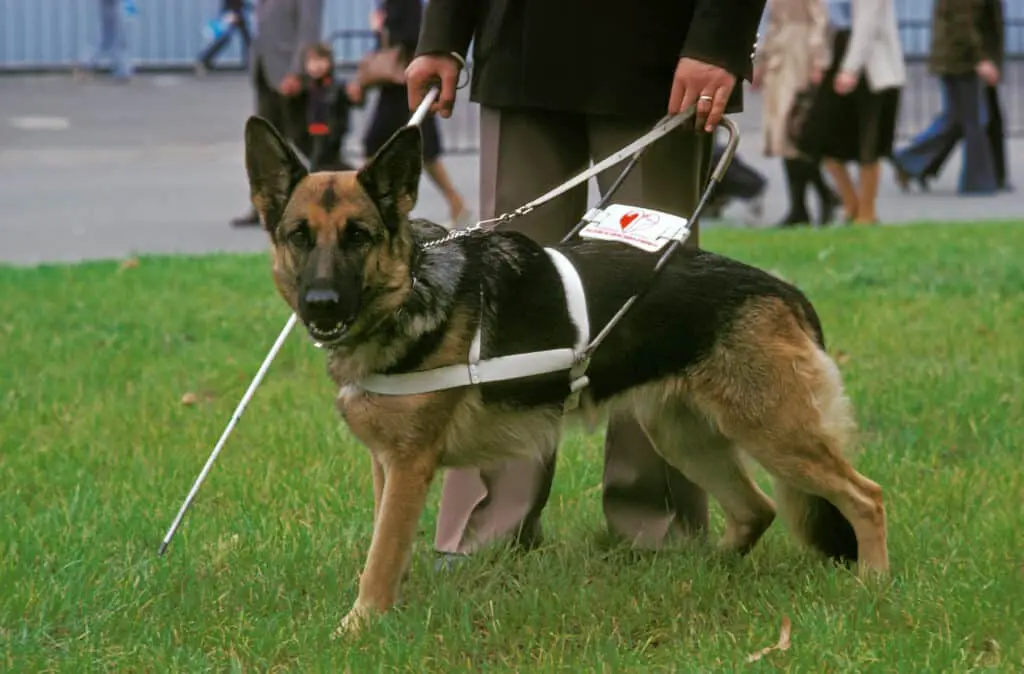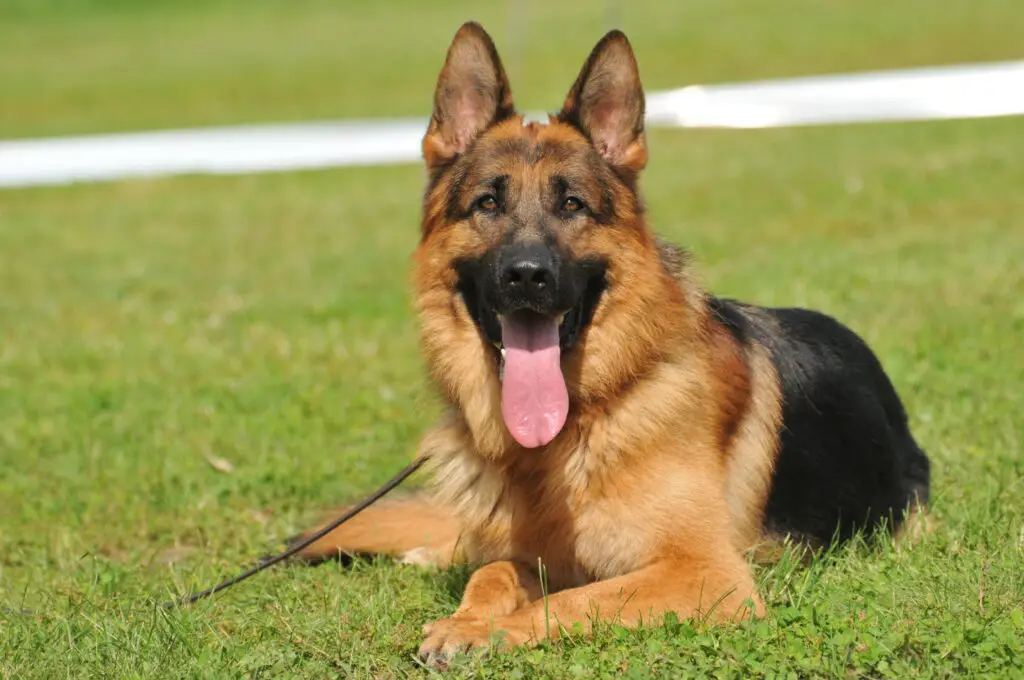Our website is supported by our users. We sometimes earn money when you click an affiliate link and make a purchase. This is at no extra cost to you and helps us to create quality content. For all that have shown us such wonderful support, we thank you from the bottom of our hearts!
German Shepherds, also known as Alsatians, are a highly intelligent and loyal and large dog breed.
Known for their noble character, these dogs have a strong work ethic, making them the perfect fit for various roles.
From herding livestock to serving in police and military units, these versatile animals have proven themselves to be skilled at diverse tasks.
As you explore the world of German Shepherds, you’ll find a breed that adapts well to a variety of environments and responsibilities.
And you will learn why it is one of the most popular dog breeds.

In addition to their working abilities, German Shepherds are prized for their trainability and confident nature.
This makes them excellent guide dogs, service animals, and even family pets.
As you get to know this breed, you’ll discover that their companionship is not only valuable in professional settings but also in providing affection and friendship within the home.
Given the breed’s intelligence and drive, it’s essential to provide proper training and socialization for your Shepherd.
This ensures that they can channel their energy into productive outlets and build positive relationships with both people and other animals.
By knowing and understanding their strong traits, you can have a rewarding and long-lasting partnership with your German Shepherd.
History
The origin of the German Shepherd dates back to the 1800s in Germany, where they were initially bred as herding dogs.
The breed was created by local shepherds and communities seeking an intelligent and agile dog capable of herding livestock and protecting their flock.
The German Shepherd Dog, or GSD, traces its roots to various herding dogs from that time, with its creation shaped by the efforts of Captain Max von Stephanitz.
In 1899, von Stephanitz founded the Verein für Deutsche Schäferhunde, the official breed club, and set the breed’s foundation with his dog, Horand von Grafrath.
Captain von Stephanitz played a crucial role in standardizing the breed.
His goal was to create a versatile and reliable working dog, focused on intelligence, loyalty, and physical ability.
Von Stephanitz’s dog, Horand von Grafrath, provided the blueprint for the breed we know today.
By the time World War I began, the breed’s reputation had grown, and German Shepherds were used as military dogs due to their intelligence and adaptability.
After the war, American soldiers returning home from Europe brought some of these remarkable dogs back with them, and the breed started to get recognition in the United States.
This breed gained further popularity in the 1920s and 1930s, thanks in part to two famous dogs, Rin Tin Tin and Strongheart, who starred in various movies and captured the hearts of viewers.
This popularity led to the German Shepherd becoming one of the most registered breeds with the American Kennel Club (AKC).
During World War II, they were once again utilized as military dogs, search and rescue dogs, and even as messengers.
Unfortunately, due to the association with Nazi Germany at that time, the AKC temporarily changed the breed’s name to “Shepherd Dog”. Post-war, the breed regained its standing, and the name was restored to German Shepherd Dog.
In summary, this breed has a fascinating history rooted in its origins as a herding dog, its rise to prominence due to Max von Stephanitz’s efforts, and its widespread recognition through military service and famous dogs such as Rin Tin Tin and Strongheart.
Today, the GSD continues to be a popular breed for various tasks, including police and military service, search and rescue, assistance work for people with disabilities, and devoted family companions.
Physical Characteristics of the German Shepherd
Height Male
Males typically stand between 24 and 26 inches tall at the shoulder.
They are strong, athletic, and well-proportioned, which makes them highly effective working dogs.
Height Female
Females are slightly smaller, with an average height ranging from 22 to 24 inches.
Similar to their male counterparts, they also possess great athleticism and an impressive build.
Weight Male
The weight of a male can vary, but generally, they weigh between 65 and 90 pounds. This muscular size contributes to their strength and ability to excel in various tasks.
Weight Female
Females are comparatively lighter, with their weight ranging from 50 to 70 pounds. Despite the difference in size, they too possess incredible agility and strength.
Eye Colors
The eyes of this breed play a significant role in their appearance. German Shepherds have almond-shaped, dark brown eyes that exude a confident and intelligent gaze.
Coat Colors
They have a diverse range of coat colors, including black and tan, black and cream, black and red, black and silver, solid black, gray, and sable.
According to breed standards, blue, liver, or white coat colors are deemed unfavorable.
Coat Types
They have a coarse, medium-length double coat that provides protection against harsh weather conditions. Consisting of a dense undercoat and a slightly longer topcoat, their fur is designed to offer excellent insulation.
Shedding is commonplace among GSDs, so be prepared for some extra grooming duties.
Life Expectancy
The life expectancy of a German Shepherd is generally between 9 to 13 years.
By ensuring proper care, exercise, and attention to their health needs, you can contribute to giving your dog a long, fulfilling life.
Temperament & Training of the German Shepherd
German Shepherds are known for their outstanding temperament, which includes traits such as intelligence, loyalty, energy, and versatility.
As a highly intelligent breed, they are easy to train and excel in various roles, from farm dogs to herding dogs, police work and search and rescue operations.
If you’re looking for a diligent working dog, a guide dog or a devoted family companion, the German Shepherd fits the bill. They are commonly used as a guard dog as well.
When it comes to training, starting early is crucial.
Socialization, a key component of a well-rounded German Shepherd temperament, should begin within their 12 to 16-week critical window of life.
This step will help your German Shepherd puppy grow into a confident and well-adjusted adult.
As highly energetic dogs, they require ample play and exercise to burn off that pent-up energy.
Regular mental stimulation is also essential, so consider incorporating puzzle toys and obedience games into your training regimen.
Given their versatility, German Shepherds are generally suited for a range of tasks, including:
- Herding dog: Despite their working dog origins in herding, they have also branched out into various fields.
- Police dog: With their keen sense of smell and strong loyalty, they are ideal for tracking and apprehending suspects.
- Search and rescue: Their intelligence and adaptability make them excellent in search and rescue dog.
- Service dog: Known for their loyalty and desire to please their handlers, they excel as service animals.

Above all, it’s important to remember that German Shepherds thrive on attention and companionship.
They may develop separation anxiety or destructive behaviors if left alone for long periods.
Be prepared to invest time and effort into ensuring their well-being, and you’ll be rewarded with a loyal, intelligent, and trainable companion that excels in both work and play.
Integrating consistent, positive training methods will help you develop a strong bond with your German Shepherd, setting the stage for a happy, healthy, and fulfilling relationship.
Health Issues of the German Shepherd
As a German Shepherd owner, it is essential to be aware of the common health conditions that may affect your dog.
By understanding these potential problems, you can take proactive steps to maintain their well-being and ensure a happy, healthy life.
Hip and Elbow Dysplasia
One of the most prevalent issues in German Shepherds is hip dysplasia, a genetic condition that causes the hip joint to develop abnormally.
This can lead to pain, inflammation, and mobility issues.
To reduce their risk of developing hip dysplasia, ensure your German Shepherd maintains a healthy weight and receives regular exercise.
Another common orthopedic issue in German Shepherds is elbow dysplasia, which involves the abnormal development of the elbow joint.
Similar to hip dysplasia, this condition can cause discomfort and difficulty moving.
Early detection through regular vet check-ups can help reduce the impact of elbow dysplasia on your dog’s quality of life.
Degenerative Myelopathy
Degenerative myelopathy is a progressive neurological disorder affecting German Shepherds.
This condition affects the spinal cord, leading to muscle weakness and eventual paralysis.
While there is no cure, early detection and supportive care can help manage the symptoms and improve your dog’s comfort.
Gastric Dilitation Volvulus
German Shepherds are also prone to gastric dilatation-volvulus, commonly known as bloat.
This life-threatening condition occurs when the stomach fills with gas and twists on itself, cutting off blood supply.
Rapid treatment is crucial, so familiarize yourself with the signs of bloat, such as a distended abdomen, restlessness, and unproductive retching.
Pannus (German Shepherd Dog Keratitis)
Pannus is an inflammation of the cornea, which can lead to blindness if left untreated.
It typically affects both eyes and starts to manifest around the age of two.
Keep an eye out for pink or red membranes at the corner of your dog’s eyes as an early indication of Pannus.
To minimize the risk of these conditions, ensure your German Shepherd receives regular veterinary care, maintains a balanced diet that meets all of its nutritional needs, and enjoys an active lifestyle.
By staying vigilant and proactive, you can help your German Shepherd live a happy, healthy life.
Grooming Your German Shepherd
Brushing
Brushing is a key aspect of grooming your German Shepherd.
Their double coat requires regular brushing to prevent matting and help maintain their coat’s insulating properties.
It’s advisable to introduce brushing to your dog at a young age. Some recommended tools include:
- Bristle brushes: ideal for light brushing and daily use
- Slicker brushes: useful for removing loose hairs and reducing shedding
- Undercoat rakes: designed to target the dense undercoat without damaging the topcoat
It’s important to brush your German Shepherd at least twice a week during normal shedding periods, and daily during seasonal shedding periods.

Bathing
When bathing your German Shepherd, be sure to thoroughly brush and detangle their coat before bathing to remove excess hair, as this will decrease the time spent in the bath.
Use a gentle dog shampoo, and don’t forget to clean their ears and under their tail.
This shampoo massager gets deep down under their fur and massages their skin.
Dry your dog thoroughly.
Related Article:
The Best Dog Shampoos for Itchy Skin
Cutting Fur/Hair
You should not shave or cut your German Shepherd’s coat because their double-layered coat helps in insulation.
However, you can trim the hair around their paws, ears, and tail for cleanliness.
Use sharp scissors specifically for dogs.
Clipping or Grinding Nails
Maintaining proper nail length is important for your dog’s comfort and overall health. You can use either a nail clipper or a grinder.
Keep the following tips in mind:
- Clip or grind nails regularly to avoid overgrowth and splitting
- Be cautious not to cut into the quick, which contains blood vessels and nerves
- Reward your dog after the process to create a positive association
If you accidently cut the quick, use styptic powder in order to stop the bleeding.
Just dip the nail into the powder and it will usually stop on the first try.
Additionally, take a look at our articles on How to Grind Your Dog’s Nails and How to Clip Your Dog’s Nails.
Dental Care
Regular dental care is crucial in maintaining your German Shepherd’s overall health.
You can brush their teeth using a soft dog toothbrush or finger brush and dog-specific toothpaste.
In addition to brushing, provide dental chews and toys to help keep your dog’s teeth clean and healthy.
Cleaning Ears
Clean your German Shepherd’s ears regularly using a gentle dog ear cleaner and a cotton pad.
Avoid using cotton swabs or inserting anything too deep into the ear canal, as this can cause damage.
These Pet MD Dog Ear Cleaner Wipes are quick and convenient.
Regular ear cleaning can help prevent ear infections and other potential health problems.
Owning a German Shepherd
Cost of Purchase
When you decide to own a German Shepherd, you need to consider the initial cost of purchase.
Prices can range from $500 to $2,000 depending on the breeder, the dog’s lineage, and pedigree.
You can find more affordable options through rescue organizations or adopting a German Shepherd.
Maintenance Costs
Once you have your German Shepherd, you’ll need to think about the ongoing expenses associated with owning this breed.
This includes dog food, routine medical costs, grooming, and insurance.
On average, the yearly cost of owning a German Shepherd can range from $700 to $1,500. Proper diet and nutrition are crucial for this large breed.
Adopting a German Shepherd
If you’re looking to adopt a German Shepherd, there are various rescue organizations and shelters where you can find one.
The cost of adoption can vary, but it is typically more budget-friendly than purchasing from a breeder.
Adopting a dog also contributes to a noble cause, reducing the number of homeless pets.
Keep in mind that adopted dogs may require more attention to training and socialization.

Finding Reputable Breeders
If you decide to buy a German Shepherd from a responsible breeder, make sure you’re working with a reputable one.
They should follow AKC breed standards and prioritize the health of their dogs over profit. A good breeder will:
- Provide references
- Show genuine concern for the dog’s well-being
- Have dogs with proper documentation and health clearances
- Offer a health guarantee and return policy
Owning a German Shepherd can be a wonderful experience, just remember the commitment involved in giving them the care, training, and grooming they need to thrive.
The initial costs, ongoing maintenance, and decision to adopt or purchase from a reputable breeder are all essential factors to consider before bringing this loyal companion into your life.
Frequently Asked Questions
What are the distinctive characteristics of a German Shepherd?
German Shepherds are known for their intelligence, loyalty, and versatility.
They have a strong build with a double coat, usually in tan and black or red and black colors. They have sharp ears that stand up straight, and a confident demeanor.
German Shepherds are popular dogs for various roles, such as police and military work, search and rescue, and service dogs.
How much should a healthy German Shepherd weigh?
A healthy adult male German Shepherd usually weighs between 65 and 90 pounds, while a female typically weighs between 50 and 70 pounds.
It’s essential to maintain a healthy weight for your German Shepherd through a balanced diet and regular exercise.
How tall do German Shepherds typically grow?
Male German Shepherds typically grow to be between 24 and 26 inches tall at the shoulder, while females usually stand between 22 and 24 inches.
Keep in mind that individual dogs may vary slightly in size, and it’s essential to consult a veterinarian if you have concerns about your dog’s growth.
What is the expected lifespan of a German Shepherd?
The average lifespan of a German Shepherd is 9 to 13 years, depending on factors such as genetics, diet, and overall health.
Regular veterinary check-ups and a healthy lifestyle can ensure your German Shepherd lives a long, happy life.

Can German Shepherds adapt well to living as house pets?
Yes, German Shepherds can adapt to living as house pets.
These dogs are excellent family dogs when trained and socialized from an early age.
They are protective, loyal, and playful, but they require consistent training and mental stimulation to keep them well-behaved and happy.
What are the specific care requirements for German Shepherd dogs?
German Shepherds require regular exercise to maintain their health and energy levels.
Provide your dog with a balanced diet and clean water to ensure proper nutrition.
Their double coat requires regular grooming, especially during shedding seasons.
Additionally, invest in early training and socialization to make sure your German Shepherd is well-adjusted and can interact positively with other dogs and people.
Regular veterinary check-ups will help you identify and address any health concerns.
Conclusion: Bottom Line on the German Shepherd

When it comes to the German Shepherd, this breed possesses numerous positive attributes, along with a few areas requiring special attention.
One of the main pros of owning a German Shepherd is their versatile personality.
They are dependable, intelligent, and loyal companions, making them ideal choices for family pets, service dogs, guard dogs, guide dogs, and police dogs.
However, having a German Shepherd as a pet also comes with some challenges.
The breed’s high energy levels and exercise requirements may demand a greater level of commitment from you.
You’ll need to ensure your dog receives an adequate amount of physical activity and mental stimulation, as a mere half-hour walk a day won’t be enough.
- Some pros of the German Shepherd breed include:
- High intelligence
- Strong guarding instincts
- Devotion to family
- Excellent companionship
- Exceptional work performance (e.g., guide and police dogs)
- Some cons may involve:
- Significant exercise and training requirements
- Possible health issues due to certain breeding practices
- An increased level of responsibility for the owner
When considering a German Shepherd, it’s crucial to understand the commitment and level of care required.
Thorough research on the breed, reputable breeders, and the differences between the working and show lines will help set you and your German Shepherd up for success.
Ultimately, if you provide your German Shepherd with love, care, and dedication, they will return the favor as an outstanding and loyal companion.
Please read our Legal Disclaimer











